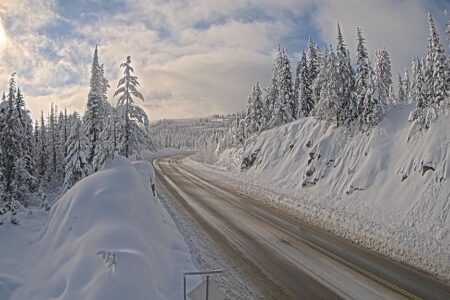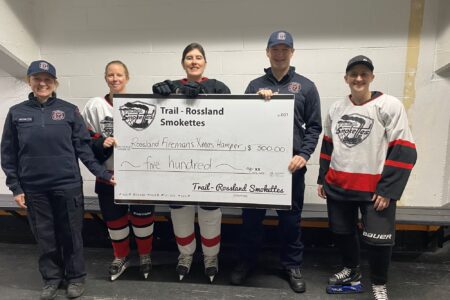Local forests lands under new ownership
Three parcels of privately-owned forest land near Rossland, formerly owned by Beaumont Timber, have been sold. The new owner is a Mr. Behn who is investing his funds in forest and agricultural land, as a less (potentially) lucrative but also less risky, more stable investment than other options.
The new manager is Monticola Forest Ltd, owned by Rainer Münter, M. Sc., RPF., and his wife Maureen. The Münters and an assistant held a meeting at the Prestige on Tuesday evening, July 8, to talk with people interested in plans for the three parcels of forest land — particularly tourism and recreational interests.
Where are these lands?
The smallest parcel, named “Topping”, includes part of the Blackjack area; some of the Blackjack trails run through it. The company pays taxes to the City of Rossland on this parcel.
The next largest parcel, named “Birch”, has a complicated shape. This parcel lies south of Rossland. Its eastern boundary is to the west of Violin Lake , and its western boundary nearly touches the largest parcel, to the west of it.
The largest parcel, called “Sophia”, runs from the U.S. border northward to the south ridge of OK and the peak of Mt. Roberts, and the northern end of this parcel also includes a portion of Record Ridge and a section of the Seven Summits Trail. This piece is nearly rectangular, but has a few jogs in its boundary.
Both “Birch” and “Sophia” form a large part of Rossland’s southerly viewscape. [See the attached pdf MAP]
Harvesting plans (AKA “logging”):
Münter explained that the rate of harvesting on the Behn lands will be much lower in the next few years than it was in the time preceding the sale of the lands.
Harvesting has now begun again on the “Birch” parcel south of Rossland and west of Violin Lake. The company has plans for limited harvesting on each parcel, partly to maintain existing roads.
What about the trails?
Münter noted that in Germany, privately-owned forest lands are accessible for public recreation — and in return, the land-owners pay much lower taxes than the taxes paid in Canada on similar parcels. In Canada, private land-owners are under no obligation to allow public use of their property.
Steven noted that people elsewhere admire Rossland’s sharing of private and public lands for recreational trails, but most locals tend to take it for granted; many people are not even aware that much of the land they are hiking and biking on is privately owned, and that our use of so many trails on so much private land is a rare privilege. The Trails for Rossland Society — now the Kootenay-Columbia
Trails Society — negotiated agreementswith property owners, allowing “our” trails to cross private lands and covering issues including insurance coverage, liability, and the type of use allowed (only non-motorized use is permitted by the landowners). If people abused the privilege conferred by these hard-won agreements, any landowner could cancel an agreement and close off all trails on their property.
Steven noted that the network of trails around Rossland is a significant economic boon to Rossland in the summer.
Concerns:
Rosslanders are concerned about the state of the viewscape, and their access to the forest lands for free public recreation: will Rossland be surrounded by unsightly clearcuts? And will Rossland’s economy suffer if access to trails is restricted?
The manager of the forest lands has concerns too.
Münter noted that invasive weeds are invading forest lands and impacting forestry operations from rights-of-way for gas pipelines, powerlines, and resource roads. He is concerned that recreational use of the lands exacerbates the problem by bringing a continual supply of weed seeds — he acknowledged that it is motorized use that spreads seeds much more than hiking and (muscle-powered) biking.
Münter was also concerned about potential user conflicts — he stated that hiking and biking are not compatible uses with hunting on the same property at the same time; he is concerned about ensuring the safety of recreational users.
And, Münter wondered whether there could be a commercial recreational use on any of the Behn lands, to bring in some income to help pay the taxes and offset the reduction in harvesting.
NOTE: Rosslanders want the economic benefits of pleasant views from town and access to recreation (preferably free of charge); the forest companies would appreciate some monetary thanks, possibly in the form of reduced taxes, for maintaining those things, which benefit Rossland economically. So far, there has not been any real attempt to bring the two sets of interests together. Can Rossland residents and Monticola work toward a mutually beneficial outcome?
























